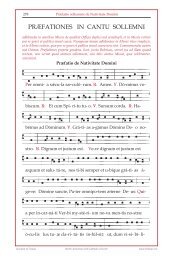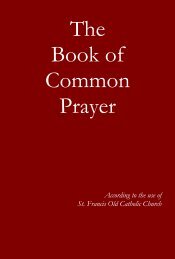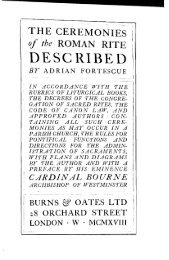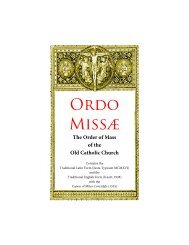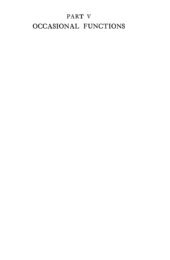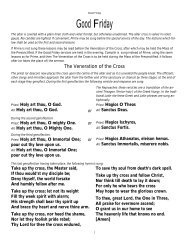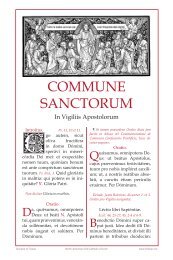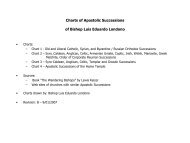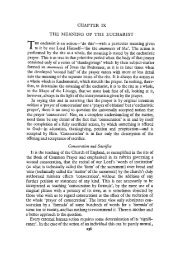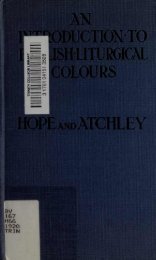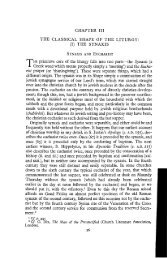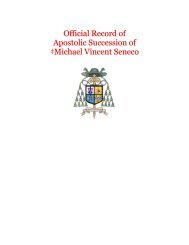Eucharist and Lord's Supper
Eucharist and Lord's Supper
Eucharist and Lord's Supper
Create successful ePaper yourself
Turn your PDF publications into a flip-book with our unique Google optimized e-Paper software.
THE SHAPE OF THE LITURGY<br />
chabUrah meal, because the meal proper began with the h<strong>and</strong>washing <strong>and</strong><br />
'grace before meals', <strong>and</strong> only those who shared in this could partake.<br />
There might be up to three preliminary courses of 'relishes' before this<br />
grace, but after the grace came the meal proper.<br />
At all jewish meals (including the chabUrah supper) this grace took<br />
always the following form. The head of the household, or host, or leader<br />
of the chabUrah, took bread <strong>and</strong> broke it with the words 'Blessed be Thou,<br />
o Lord our God, eternal King, Who bringest forth bread from the earth'.<br />
He then partook of a fragment himself <strong>and</strong> gave a piece to each person at<br />
the table.<br />
The meal itself followed, each fresh kind of food being blessed by the<br />
host or leader in the name of all present the first time it appeared. By an<br />
exception, if wine were served at the meal each person blessed his own<br />
wine-cup for himself every time it was refilled, with the blessing, 'Blessed<br />
art Thou, 0 Lord our God, eternal King, Who createst the fruit of the<br />
vine'.<br />
At the closeof the meal an attendant brought round a basin <strong>and</strong> a napkin<br />
(<strong>and</strong> sometimesscent) <strong>and</strong> h<strong>and</strong>s were washed again.!<br />
Finally came the grace after meals-'the Blessing' or 'Benediction' as it<br />
was called, without further description. (I propose in future to call it 'the<br />
Thanksgiving' for purposes of distinction, but the same word, berakah =<br />
'blessing' was used for it as for the short blessings, e.g.over bread or wine<br />
above, or other foods.) This was a long prayer said by the host or father of<br />
the family in the name of all who had eaten of the meal. It was of strict<br />
obligation on all male jews after any food 'not less than the size of an<br />
olive' or 'of an egg'.2 But on any important family occasion, <strong>and</strong> at a<br />
chabUrah supper in particular, a little solemnity was added by its being<br />
recited over a special cup of wine (which did not receive the usual wineblessing)<br />
which was known quite naturally as 'the cup of the blessing' (for<br />
which we shall use here S. Paul's phrase 'the cup of blessing'). At the end<br />
of 'the Thanksgiving' this was sipped by whoever had recited the prayer,<br />
<strong>and</strong> then h<strong>and</strong>ed round to each of those present to sip. Finally, at a chabUrah<br />
supper, the members sang a psalm, <strong>and</strong> then the meeting broke up.<br />
The text of 'the Thanksgiving', which formed the grace after all meals,<br />
may be giventhus:<br />
'The host begins: "Let us give thanks ..." (if there should be an hundred<br />
persons present he adds "unto our Lord God'')3.<br />
'The guests answer: "Blessed be the Name of the Lord from this time<br />
forth for evermore."<br />
1 If scent were used it was poured on the h<strong>and</strong>s of the guests, who then wiped<br />
them on the hair of the attendant! Ibid. Tosefta, vi. 5 (p. 68).<br />
• Ibid. M., vii. 3; T., v. 14(p. 60).<br />
• Ibid. M., vii. 5 (p. 62). The text of this invitation was made to vary a little<br />
according to the size of the company addressed. The rules for these variations are<br />
Jlivenin this passage of Berakoth.



